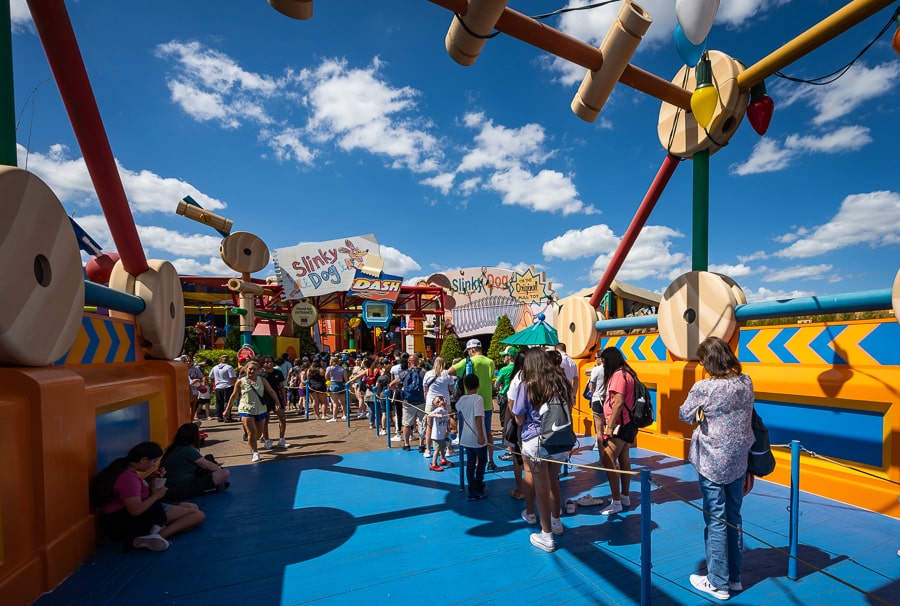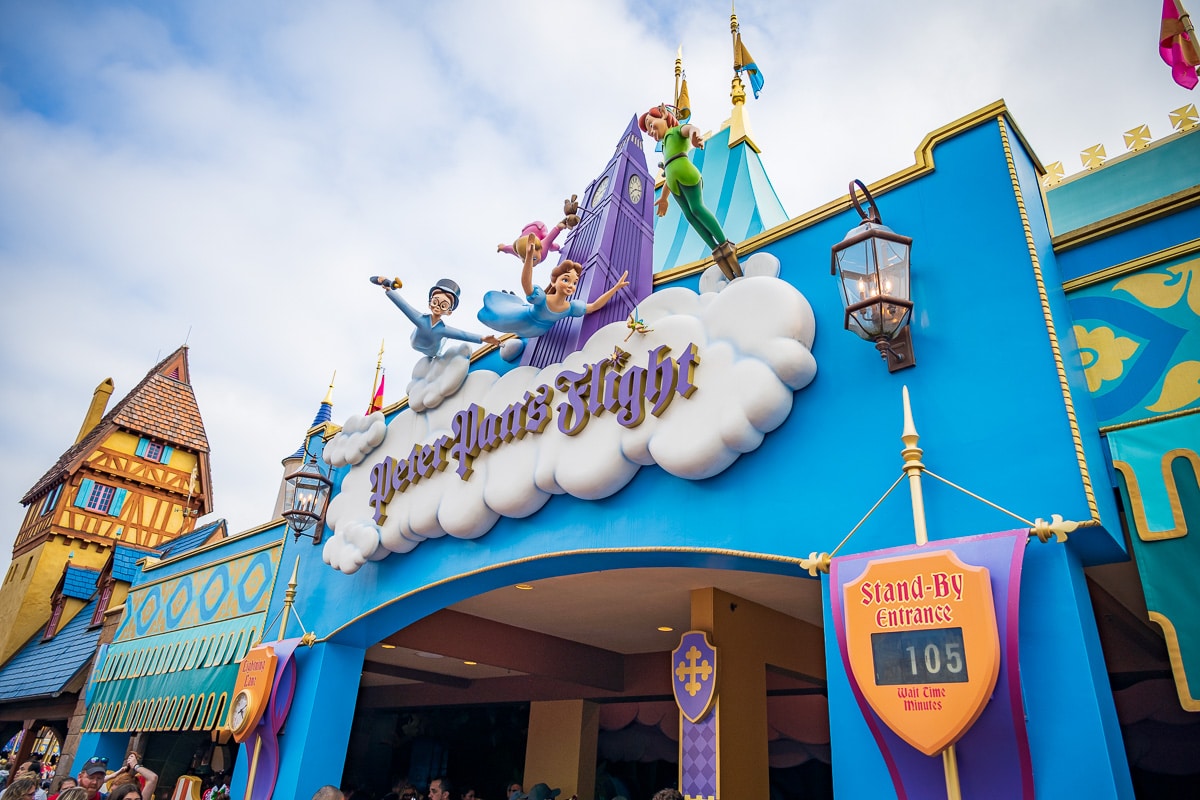
A proposed class motion lawsuit has been filed in opposition to Walt Disney Parks & Resorts and Encourage Well being Alliance for modifications made to the Incapacity Entry Service system final 12 months at Walt Disney World and Disneyland. This covers particulars of the DAS criticism, plus an in depth have a look at previous precedent within the final authorized problem to line-skipping lodging within the parks.
Disney overhauled DAS at Walt Disney World and Disneyland previous to the beginning of final summer time. In keeping with the corporate, the modifications had been due largely to abuse, misuse, and proliferation of this system’s use–with issuances of DAS tripling from 2019 to final 12 months. For extra in regards to the specifics of the new-look Incapacity Entry Service, plus our commentary about winners & losers, collateral injury and extra, see Incapacity Entry Service (DAS) Modifications at Walt Disney World FAQ.
We’ve been following this controversy carefully for the final a number of months, receiving studies from readers and studying accounts of different friends making use of for lodging after the overhaul of DAS at Walt Disney World and Disneyland. Clearly, it’s a extremely delicate topic that could be very, very private since it’s, fairly actually, make or break for some friends making an attempt to expertise the parks. There have been widespread studies of friends who beforehand had DAS being denied and suggested to make use of various lodging, a few of that are new–or are revised and highlighted extra prominently.
Suffice to say, it’s been a contentious ~9 months between the corporate and the disabled group. Many followers have hoped that Walt Disney World and Disneyland would loosen up the coverage or overhaul it as soon as once more, and there’s been a grassroots marketing campaign to perform precisely that.
There have been a few current tweaks to this system, probably the most notable of which is DAS verbiage eradicating “solely” from the eligibility standards. As we beforehand identified, that possible concerned involvement from a military of attorneys, and even then, its motivations and outcomes are open to interpretation and debate. Our view is that it’s pretty consequential within the amount of DAS issued regardless of being solely a single phrase.
We thought we’d by no means know for certain what prompted the “solely” change or what consequence it’ll have on the ratio of approvals to denials, however because it seems, this lawsuit stands out as the reply. The criticism depends closely on the presence of solely, and a requirement letter from final December that preceded the lawsuit.


The proposed class motion swimsuit Malone vs. Walt Disney Parks & Resorts, Encourage Well being Alliance, et al., was filed within the Superior Court docket of Orange County, California on February 10, 2025. You possibly can learn the criticism for your self right here.
Plaintiff Trisha Malone alleges that she utilized for DAS based mostly on a bodily incapacity. Her DAS lodging was denied on the grounds that she didn’t meet Disney’s newly imposed eligibility standards, which now restricts DAS lodging to friends who, because of a developmental incapacity corresponding to autism or an identical situation, are unable to attend in a traditional queue for an prolonged interval.
The plaintiff alleges that new eligibility standards imposed by Disney screens out people with bodily disabilities, thus denying them the lodging required to get pleasure from full entry to Defendant’s services. Malone additionally alleges that Disney’s various lodging—corresponding to Attraction Queue Re-Entry, Meet-Up, Rider Swap, or Location Return Instances—fail to supply equitable entry and imposed undue burdens, logistical challenges, emotional misery, and security dangers.


Malone contents that the brand new DAS insurance policies and practices systematically discriminate people with bodily disabilities in violation of the Individuals with Disabilities Act (ADA) and the California Unruh Civil Rights Act.
The brand new DAS violates her rights to equal entry, privateness, and dignity underneath these acts and likewise infringes upon Well being Insurance coverage Portability and Accountability Act (HIPAA) tips, state privateness rights underneath the California Confidentiality of Medical Data Act (CMIA), and comprises misleading phrases and situations that contravenes the Shopper Authorized Treatments Act (CLRA), in addition to California Enterprise and Professions Code § 17200.
There are seven causes of motion in complete, all of that are California state regulation claims. (California’s Unruh Civil Rights Act incorporates the Individuals with Disabilities Act by reference, which is how that’s looped into the lawsuit.)


From our perspective, the crux of this case is in whether or not the new-look DAS imposed eligibility standards that “display out or are inclined to display out a person with a incapacity or any class of people with disabilities from absolutely and equally having fun with any items, providers, services, privileges, benefits, or lodging, except such standards will be proven to be mandatory.”
(I discussed this earlier than in evaluation of the “solely” change: By limiting the lodging to solely friends with developmental disabilities, it’s doable Disney is pre-screening out a category of disabled people which may run afoul of the ADA. In that case, that’s nonetheless true with a simple studying of the assertion of intent, since “solely” merely reinforces the “because of” (similar to earlier iterations included “small share” of friends language).)
The core authorized query is whether or not, by limiting DAS lodging to friends with developmental disabilities who’re “unable to attend in a traditional queue for an prolonged time period,” Disney is unlawfully screening out people with bodily or non-developmental disabilities.
Can Disney exhibit that limiting DAS lodging to solely these people with developmental disabilities is important for the availability of its providers? Mainly, that ought to boil down as to whether the pre-screening lawful in mild of the choice lodging provided?
There’s clearly much more to the criticism than that, however we’re primarily involved with the ADA. That’s what will probably be outcome-determinative for the way forward for DAS. The California claims are essential for this specific plaintiff (and preserving the case in state courtroom), however that is ultimately going to be determined in federal courtroom.


In life and regulation, the most effective predictor of future outcomes is previous precedent. To that time, there’s the case of A.L. v. Walt Disney Parks and Resorts US, Inc. from just a few years in the past that was filed in response to the change from the Visitor Help Card (“GAC”) to DAS. In that, the Eleventh Circuit Court docket of Appeals addressed whether or not Disney’s lodging for friends with disabilities complied with the Individuals with Disabilities Act (ADA).
You possibly can learn the full appellate determination right here, however I’m going to undergo a number of the key info, authorized points, and the courtroom’s findings under. As you learn, I feel you’ll spot quite a few parallels between the previous and present controversies and circumstances.
In that case, A.L. is an grownup male identified with autism who visits Walt Disney World along with his mom. A.L. is in his late twenties, however his developmental age is 5 to 7 years outdated. Resulting from his situation, A.L. has extraordinarily restricted communication expertise and requires a structured routine, disruption of which ends up in meltdowns.
Till October 2013, the GAC system offered a disabled visitor and his group with limitless, repeated, and on-demand entry to rides and points of interest. A.L. used this to expertise, so as, an inventory of 19 points of interest he loved at Magic Kingdom. Nevertheless, Disney decided that the GAC system was unsustainable due widespread abuse and fraud. It turned a limiteless front-of-the-line cross for anybody requesting it as a result of Disney couldn’t ask a customer for proof of incapacity. The GAC system turned a media sensation for the entire mistaken causes, with mainstream tales about friends hiring disabled tour guides. (Sound acquainted?)


Throughout that case, Disney’s Industrial Engineering group offered the outcomes of its research on attraction influence ensuing from GAC, which was important. The examine concluded that the GAC system was unintentionally offering a small minority of holiday makers a number of alternatives to expertise a given trip whereas denying common friends the possibility to expertise a given trip even as soon as. This examine prompted Disney to implement modifications to the GAC system within the curiosity of balancing friends’ wants.
In October 2013, Disney changed the GAC system with the DAS program. You’re most likely aware of this, because the mechanics of DAS are pretty unchanged then versus now (it’s the approvals and denials which can be at difficulty right here). Mainly, A.L.’s household decided that the return time system utilized by DAS required too lengthy of a watch for A.L., and since it could not be doable to go to all of A.L.’s common rides so as with out some ready, and that they would wish to go away the park.
The DAS program proved to be unpopular amongst a few of Disney’s followers with disabilities. By early 2014, plaintiffs started submitting lawsuits—forty-four in complete—difficult the DAS program on the premise that it violated Title III of the ADA as a result of it didn’t permit guests with disabilities to go on rides with out ready and within the order they needed. The plaintiffs filed their circumstances in both the Central District of California or the Center District of Florida; the circumstances filed in California ultimately had been transferred to the Center District of Florida.
A.L. sought a everlasting injunction requiring that he be permitted limitless entry to Walt Disney World’s points of interest through the FastPass strains or comparable aid via at the least ten Re-admission Passes (“Re-Adverts”). The central query of the consolidated case was whether or not Disney’s current incapacity lodging had been ample underneath the ADA or if the requested modifications had been mandatory and affordable.


The district courtroom discovered that A.L.’s requested modification of limitless entry to Disney’s theme park points of interest—through Disney’s expedited FastPass strains or via at the least ten readmission passes for every particular person in his occasion—was neither mandatory nor an affordable lodging. As as to whether the proposed modification was mandatory, the district courtroom discovered that entry for A.L. utilizing the DAS Card and FastPass, with out additional modification, was a “like expertise” to that of non-disabled friends.
The district courtroom defined that, as a result of the DAS system allowed disabled friends to entry the preferred points of interest within the park with much less wait time than the standby line, these friends may expertise extra points of interest than a non-DAS visitor may expertise as a result of a few of their time spent ready in bodily strains all through the day had been eradicated.
The district courtroom famous that Disney’s proof confirmed A.L. may have skilled “a considerably increased variety of rides than a typical nondisabled visitor experiences in a day.” Thus, the district courtroom discovered that the DAS card offered A.L. with a “‘like,’ if not higher, expertise and equal enjoyment than nondisabled friends expertise.”


As to reasonableness, the district courtroom defined the lodging would “lengthen the wait instances for all different riders, severely impacting the remaining non-DAS customers,” and “probably result in the identical fraud and overuse that existed with the GAC system, which required an entire overhaul.”
The district courtroom additionally famous that “phrase spreading on social media that one disabled particular person obtained an lodging of ten readmission passes will improve the demand to be handled equally by each disabled particular person as soon as they discover out, in addition to these keen to misrepresent they’re disabled,” resulting in the identical points plaguing the GAC system.
Even when the requested modification had been mandatory and affordable, the district courtroom decided that Disney was not required to accommodate A.L. with the request as a result of, based mostly on Disney’s uncontroverted industrial engineering research and its professional’s opinion, it could basically alter Disney’s providers to its different guests, by rising wait instances for many different friends with out DAS, which in flip would dramatically scale back visitor satisfaction ranges.


In assessing whether or not A.L.’s requested modification to the DAS program was mandatory underneath Title III of the ADA, the courtroom held that Disney should afford A.L. “the chance to have one thing akin to or much like the expertise” of non-disabled friends however Disney “was not required to make the popular lodging of A.L.’s alternative.”
As a result of locations of public lodging should “present disabled patrons an expertise corresponding to that of able-bodied patrons,” whether or not an lodging sought by a disabled particular person is “mandatory” as a matter of regulation is set by contemplating first “how [the business’s] services are utilized by nondisabled friends.”
The evaluation then turns as to whether the enterprise has taken affordable steps to supply disabled friends with a ‘like expertise’ to that of non-disabled friends. “[F]acilities usually are not required to make the popular lodging of plaintiffs’ alternative. Amenities want make solely affordable lodging which can be ‘mandatory.’” As a matter of regulation, it isn’t sufficient to indicate that the lodging Disney presents doesn’t remove all discomfort or problem.
As a result of authorized points raised on this case which can be distinct from A.L., I believe the above reasoning will probably be key to the final word consequence of this case.


The Eleventh Circuit affirmed the district courtroom’s judgment in A.L., agreeing that the requested modifications weren’t mandatory and would basically alter Disney’s operations. The courtroom emphasised that the ADA doesn’t require companies to make lodging that may basically change their providers or operations.
It’s value noting that the Eleventh Circuit cited a number of different ADA circumstances involving Disney Parks & Resorts in its determination. I checked every of those selections they usually had been likewise determined in Disney’s favor with comparable reasoning. (Which tracks, as a courtroom usually would cite precedent that assist its conclusions.) Maybe additional analysis would reveal selections the place the plaintiff prevailed, however I may discover no such circumstances. There’s a primary time for every part, however I don’t consider the Malone case will probably be that point. It is going to be an uphill battle for the plaintiff right here, or in any future circumstances difficult the new-look DAS, to prevail.
However, it’ll be fascinating to see what occurs. As we’ve talked about beforehand, it was inevitable for the DAS modifications to finish up in courtroom. Disney possible seen a lawsuit as the price of doing enterprise, and had its authorized group meticulously put together the brand new DAS insurance policies in a way that may make them litigation-proof. There have been 24 lawsuits final time, with the primary filed just a few months after GAC was retired in favor of DAS. If something, it’s shocking there haven’t been extra complaints filed this go-round, and sooner. It’ll be an fascinating saga to look at, and if this does proceed to trial, it’s possible that extra will probably be revealed about abuse and misuse numbers both through discovery or testimony of Disney’s Industrial Engineers.
Planning a Walt Disney World journey? Study motels on our Walt Disney World Accommodations Opinions web page. For the place to eat, learn our Walt Disney World Restaurant Opinions. To save cash on tickets or decide which sort to purchase, learn our Ideas for Saving Cash on Walt Disney World Tickets submit. Our What to Pack for Disney Journeys submit takes a singular have a look at intelligent gadgets to take. For what to do and when to do it, our Walt Disney World Trip Guides will assist. For complete recommendation, the most effective place to begin is our Walt Disney World Journey Planning Information for every part you could know!
YOUR THOUGHTS
Ideas on the lawsuit in California over DAS insurance policies at Walt Disney World and Disneyland? Suppose this litigation will lead to modifications or one other complete overhaul to Incapacity Entry Providers? Hopeful that this can immediate elevated approvals for many who actually want DAS whereas preserving abuse low? Agree or disagree with our evaluation? Please attempt to keep on subject–we’ve seen a few of these DAS feedback sections get heated and private. Talk about the coverage itself, not others’ use (or lack thereof) of it.

